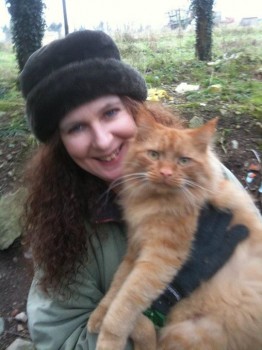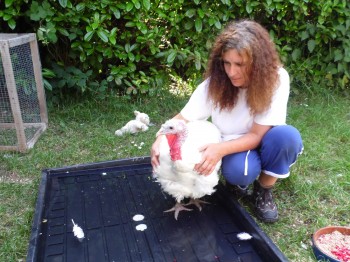Longtime readers of my blog will know that I am not a vegetarian (see Confessions of a Carnivore,) but that I believe in both the physical and moral benefits of eating less meat (see On Eating Animals and Exercising Your Moral Muscles.) One of the most compelling voices in this area is Sandra Higgins, an Irish psychologist who runs the Compassion Foundation of Ireland, is the Director and Founder of Eden Farmed Animal Sanctuary, and heads up Matilda’s Promise, an Animal Rights and Vegan Education Centre, where she gives online help to those who wish to learn more about living a non-violent lifestyle. In this week’s article, Sandra gives us all some “food for thought” about the kind of diet we eat. Enjoy. –J.M.

Sandra and Joshua
Many people are concerned about the relationship between diet and wellbeing. Discussion usually centers around what to eat: typically how much of this and how little of that is recommended in order that we feel good, physically and psychologically. Most of us are aware that plant-based foods are recommended for good health and when we encounter poor health we are often advised against consuming some animal foods.
The American Dietetics Association supports the research on the benefits to health of a vegan, plant-based diet that includes vegetables, fruits, grains, pulses and nuts and excludes all animal foods (Position of the American Dietetics Association on Vegan Diets: J Am Diet Assoc. 2003 Jun;103(6):748-65 and J Am Diet Assoc. Volume 109, Issue 7, Pages 1266-1282, July 2009).
However, there is another relevant perspective to the issue of human diet: the impact that our choices have on others. Most of us eat mindlessly, oblivious to the fact that the food we eat for sustenance, comfort and nurture has deprived others of their equal right to those states.
The psychological health of the human species is inextricably linked with the wider issue of planetary wellbeing, and with the wellbeing of all who inhabit the planet, human and non-human. Animal agriculture has repeatedly been documented as one of the greatest sources of environmental destruction and climate change, and a significant contributor to world hunger (Steinfield et al., 2006., Livestock’s Long Shadow, Environmental Issues and Options, FAO, United Nations; Goodland, R. and Anhang, J., 2009, Livestock and Climate Change; http://www.fao.org/hunger/en/.)
If one takes cognisance of the fact that the non-human animals who are used in animal agriculture are also sentient, then it does not make sense at all to speak of human physical and psychological wellbeing based on a disregard for the harm that we inflict on the animals we use for food.
Most of us are blind to the pain we inflict, for example, when we participate in the exploitation of cows who are bred to produce milk far in excess of what they need to feed their own offspring. Most people who consume dairy products are unaware of the grief that cows and calves exhibit when newborn calves are taken from their mothers so that humans can drink their milk. Science and common sense acknowledge that the mammalian (and avian) mother child bond is one of the strongest imaginable. Breaking this bond results in emotional pain that is not significantly different whether one is a human mother or a cow mother.

We are also blind to the suffering that egg consumption causes to billions of sentient individuals annually. Egg Laying Hens are the individual chickens who have been selectively bred by humans so that their reproductive systems can be exploited for the purpose of obtaining the eggs that are their equivalent of a human female menstrual cycle and childbirth. In the wild hens lay at most two clutches of eggs annually for the purpose of hatching their young. In contrast, egg laying hens are required to lay eggs on an almost daily basis exacting an enormous toll on their bodies that includes osteoporosis, prolapse, infection, and bone and reproductive cancers. The hens who lay the eggs that humans eat, like other avians, have brains that process information in ways that are similar to our primate brains.
People who view other animals in a compassionate and just way have deep, significant and enduring bonds with hens and find that they have cheerful, engaging, inquisitive, intelligent natures despite the harm inflicted on them by breeding them for human use (see http://www.upc-online.org/thinking/social_life_of_chickens.html and http://www.edenfarmanimalsanctuary.com/wp-content/uploads/2013/05/Enriched-Cages-and-Embodied-Prisons.pdf ). The film, You Haven’t Lived Until You’ve Hugged a Turkey documents the respectful , affectionate bond that can develop between humans and other animals when we become open to their sentience.
There are many other ways in which our human lifestyles cause unnecessary suffering to other beings: unnecessarily using products that are tested on other animals, wearing their skins, wool or feathers, participating in entertainment or attempting to gain academic or scientific knowledge in ways that violate them. However, most of the suffering that we cause to other animals is attributable to our food choices.
Failure to acknowledge the sentience of the animals we use not only contributes to violation of their rights that causes unimaginable suffering, loss of liberty, and the ultimate price of loss of life; it also greatly detracts from the richness that is available in our lives when we include these creatures in our sphere of compassion, equality and justice. There is a growing body of evidence that suggests that our world would be a more peaceful place if our lifestyle habits, especially those pertaining to diet, were ethically motivated by our wish to avoid causing suffering to others.
By Sandra Higgins
For more information on Sandra Higgins and her work, visit her websites:
The Compassion Foundation of Ireland http://www.thecompassionfoundation.org/.
Eden Farmed Animal Sanctuary http://www.edenfarmanimalsanctuary.com/.
Matilda’s Promise http://www.matildaspromise.org/.

Simply put, thank you for posting this.